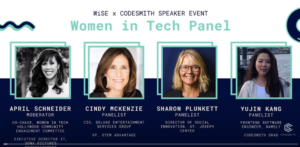M+E Daily

Women in Tech Tackle Challenges Facing Females in the Industry
Story Highlights
The importance of women in tech and the obstacles they face in growing their careers during the COVID-19 pandemic and beyond, along with the historical challenges they continue to confront, were among the topics discussed during a recent online Women in Tech panel hosted by Codesmith and Women in Software Engineering (WiSE), in partnership with Women in Technology Hollywood (WiTH).
More than 80 women and male allies participated in the Aug. 26 panel, part of the Codesmith Speaker Series, which was timed to celebrate Women’s Equality Day. April Schneider, co-chair of the WiTH Community Engagement Committee, served as the event’s moderator.
One ongoing challenge continues to be representation in the sector, according to Cindy McKenzie, CIO for Deluxe Entertainment Services Group, as well as VP and co-founder of STEM Advantage, a nonprofit organization that helps women and underserved communities get college degrees in science, technology, engineering and math.
Noting that she has been in IT for her entire career, McKenzie said probably 30-40 percent of students were women when she got her degree in the field – and that has shrunk to only about 12 percent now, although “it is starting finally to tip” up once again.
She strongly encouraged females to consider entering the IT sector, which can provide women with “one of the best careers” you can have because “you can do anything … you can work in any industry.” After all, “everybody needs IT,” she noted.
While you may face many challenges, she pointed out: “You’re always going to have challenges…. You’re going to have new challenges even in an existing role on a regular basis. You’re not growing if you’re not challenged…. You should be in a job that you feel challenged at or you shouldn’t be doing it…. I would say first go with the mindset that a challenge is an opportunity because that is what life is.”
She also cautioned that, “when you take a new role anywhere… it’s never going to be exactly what you think you’re signing up for.” After running an IT organization, she joined Deluxe about four years ago and “I thought I knew what I was getting into,” but realized it was “much more infrastructure-related than I was used to,” she recalled. Her Deluxe team was also 95 percent male and she was the only female executive above manager, she noted.
However, in a situation like that, she advised: “You have to trust that your skills are a match” for what a company hiring you is looking for and “you have to use the skills you have and then, where you feel like you’re a little weak, you have to figure out how to shore that up.”
Overcoming such challenges require confidence and the “ability to problem solve” — looking at a problem and learning how to address it, she explained, adding that, in her personal case, “I was able to figure it out and do it and now I know that stuff” I was not a specialist at initially “inside and out.”
Women also need to learn to look at job challenges like males, who are more likely to be confident enough in their accomplishments and talents to take a job even if they think there is one part of it they may not be an expert at, she noted, referring to the problem of “impostor syndrome” that females are more likely to have than males.

The Importance of Networking and Mentoring
Also crucial for women in the industry: Building a network, McKenzie said, suggesting females attend industry events and do anything else possible to get themselves in peer groups.
And she also stressed the importance of newcomers to the sector finding a mentor. “People like to mentor and people like to give advice,” she said, pointing out: “I mentor all the time and everyone who asks me to mentor, I mentor.”
It is indeed “really important to find a mentor,” according to Sharon Plunkett, director of social innovation at St. Joseph Center, a Los Angeles regional non-profit organization, and leader of its Codetalk web technology job training program for women.
Mentors can help newcomers get a better idea of what issues to ignore and what to focus on, and can also help provide advice on salary negotiations, Plunkett said.
A mentor is “something that I didn’t have early on in my career” and is something she could have used back then, Plunkett said, urging women: “Go pursue it. Don’t wait for it to fall on your lap.”
COVID Challenges
Now, on top of all the other challenges that women have faced, there are additional disadvantages created by the pandemic, Plunkett noted. For one thing, there’s the physical separation and being unable to connect with each other as easily as in the past, she said.
During the pandemic, what has been useful for her has been finding alternative ways to connect with people and finding things that “nurture” and “feed the creative” and good energy that she has – such as participating in online industry panels like this one, she said.
What is key is that, regardless of what the circumstances are, “even when they’re less than ideal, it’s what you do with the resources that you have” to confront a problem and “figure out the best way to solve it,” she said. “That’s especially true right now,” she noted, adding: “If you don’t throw yourself at it and fully engage with it — if you wait for the environment to look exactly as it should before you engage with it, then you might be waiting a really long time.”
Addressing her fellow panelists and viewers, she said: “Every single person here” taking part in this webcast “has something to contribute by virtue of the fact that you’re [here] having this conversation and listening to it. And if you’re not going to contribute your piece, then we’re all losing out.”
Her suggestion: Apply what is in your brain and your heart to finding solutions to problems and “stop worrying” about some person who may be “doing it better” or may have went to a better college than you did, she said. After all, “the industry – the world — is not going to change by itself,” she noted.
Another suggestion: Don’t be “overpowered by the negativity” and what is wrong in the industry and the world, she said, urging women to go out and help make the changes that are needed.
“Right now, every assumption we’ve ever had has been upended,” she noted, suggesting everybody learn to “use this to our advantage.”
In a similar vein, Yujin Kang, frontend software engineer at human resources software company Namely and a Codesmith graduate, told her fellow females in the industry: “The only person that you should compare yourself to is how you were before,” noting “you know a lot more now than you did three months ago or a year ago.”
Of the pandemic, Kang said: “The key to succeeding in this remote work environment is definitely overcommunicating – keeping your manager, product manager” and others “in the loop [and] always assume that people don’t know what you’re working on.”
Kang also suggested keeping in contact with others at your company who are not working on the same project and “making sure that you’re not burning out” and not working non-stop for too many hours. To combat the latter issue, she suggested setting a timer to remind yourself to walk around and have some water every now and then or try to keep to a strict schedule.
Parting Advice
Concluding the event, Kang’s parting advice for viewers was to “surround yourself with people who support you” because “having that support system definitely in this industry” is important.
McKenzie’s final advice was to “always take every opportunity that you’re offered that is a growth opportunity…. When you get an opportunity, figure out how to say yes.”
And Plunkett offered several suggestions: First, when starting out, “don’t be afraid to ask” when you don’t know something and don’t pretend you know everything. Second, “watch out for our own biases… the things that we say to ourselves – the notions that we have about what we can’t do – because those’ll sometimes just take us out of the game,” such as saying you don’t belong there. Third, discrimination is inevitable, “ but don’t let that smallness get in your way” – let your response to that smallness be creating great work. And, last, always look for opportunities to grow your portfolio.
To view the full event, click here.









